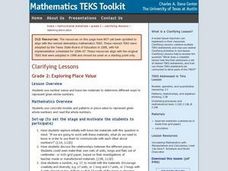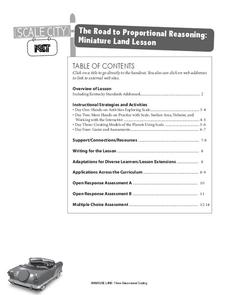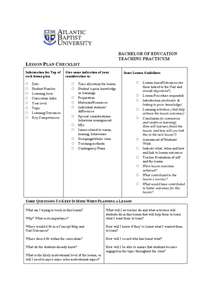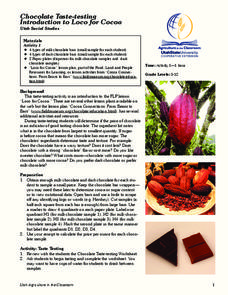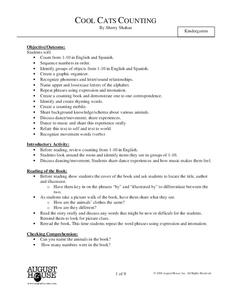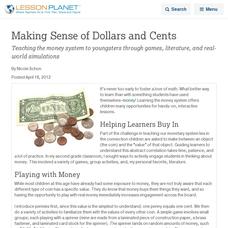Montana Office of Public Instruction
Native American Culture: Counting, 1:1 Correspondence
Kindergarteners practice showing 1:1 correspondence while incorporating information they learned about a local Native American culture. The objects used for counting are taken from the previous day's Native American lesson. The intention...
EduGAINs
Solving Linear Equations
To find x, you have to get it by itself, correct? Individuals solve a linear word problem and share their solutions with others that solved the problem in a similar fashion. They then complete a self-assessment on how they feel about...
Curated OER
Grade 2: Exploring Place Value
Creative problem solving is fun and helps kids conceptualize content. They use grid paper, manilla paper, and markers to cut, draw, and show given double-digit numbers as many ways as they can.
Kentucky Educational Television
The Road to Proportional Reasoning
Just how big would it really be? Young mathematicians determine if different toys are proportional and if their scale is accurate. They solve problems relating scale along with volume and surface area using manipulatives. The...
Mathematics Assessment Project
Sharing Costs Equitably: Traveling to School
Drive or take the school bus? Class members determine the amount each student would have to pay in a carpool situation. They then evaluate the cost in a set of provided examples. I think I'd rather take the school...
Curated OER
Pattern Block Fractions
Fourth graders participate in a lesson that is about the finding of different fractional sizes with the help of pattern blocks. They define the vocabulary terms of numerator and denominator. The lesson also uses geometry and relates it...
Curated OER
Developing Strategies for Addition and Subtraction
Primary graders develop strategies to assist them with addition and subtraction. They discover number combinations and numerical facts which enable them to add and subtract more effectively. Students use these techniques to complete...
NASA
Lights on the International Space Station
Groups explore illumination with NASA's Lighting Environment Test Facility (LETF) as a context. Using the TI-Nspire app, groups determine the lux equation that models their simulation. They then use the lux equation to...
Curated OER
Rounding Decimals
Fourth graders engage in a lesson that is about the concept of rounding decimals. They review place value and focus it upon the practice of rounding. Students use 10 base decimal grids or models to help make connections with the skill.
Curated OER
Touch
Learners discover how sense of touch helps us explore our world by feeling it and learning the size, texture and shape of things.
Curated OER
Chocolate Taste-Testing: Introduction to Loco for Cocoa
Students compare chocolates using their five senses and determine the value of the chocolate. In this chocolate lesson, students sample various types of chocolate. Students study the price per ounce of each bar to complete the...
Curated OER
Contaminated Drinking Water
Students predict, experiment, and draw conclusions about the safety of drinking water. In this ecology instructional activity, students participate in an experiment to determine if they can taste or see contamination in drinking water....
Curated OER
Total Cost and Unit Cost
In this unit rate learning exercise, students solve 6 problems in which the unit rate in a consumer math story problem is calculated. There are no examples or instructions.
Curated OER
Adding Integers with Counters
Learners add integers and use counters to create a visual. In this algebra lesson, students work in pairs as they use the computer to add integers. They complete an assessment on adding integers at the end of the activity.
Pennsylvania Department of Education
Fraction Strips
Students explore number sense by participating in a class fraction game. In this number value lesson, students utilize strips of paper with fractions written on them and conduct a trivia game in which teams challenge each other. Students...
Curated OER
A Plane Old Time
Fourth graders become familiar with a chart and use the information to create a flight plan. In this flight plan lesson, 4th graders access background knowledge of the role of flight controllers and the number concepts they...
Curated OER
Make a Match
Second graders examine the relationship between addition and subtraction. In this number sense lesson plan, 2nd graders practice their computation skills and use various strategies (including manipulatives...
Curated OER
Relationship Between Addition and Subtraction
Students are taught how to add and subtract and use number sense to solve basic math problems. In this addition and subtraction instructional activity, students are being taught using theories from different philosophers in education....
Curated OER
Cool Cats Counting
Students practice number sense with the book Cool Cats Counting by Sherry Shahan. In this number lesson, students listen to the book and count from 1-10 in English and Spanish. They practice their alphabet, rhyming words, and...
Curated OER
Making Sense of Dollars and Cents
Teaching the money system to youngsters through games, literature, and real-world simulations
Curated OER
Smiling at Two Digit Multiplication!
How do I solve a two-digit multiplication problem? Your class tackles this question by walking through problem solving methods. They first investigates and applies traditional multiplication methods, and they then compare those with...
Curated OER
Whole Number Sense
Students find the shapes that are asked of them out of a bunch of shapes. In this shapes lesson plan, students find a specific number of a specific shape with a specific size and color.
Curated OER
Two-Dimensional Drawings from Three Dimensional Objects
Sixth graders identify and replicate two dimensional illustrations of three dimensional objects. In this spatial visualization lesson, 6th graders practice viewing objects from various sides. Student participate in stations to view...
Curated OER
Makiing Sense of the Census
Students investigate trends in agriculture. In this secondary mathematics lesson, students evaluate agricultural census data from 1982 to 2202 as they compare the properties of the mean and the median. Students explore what...


